
As contactless card spending surged by nearly a third in 2018, and with over 20 million transactions taking place each day, new data released by Paymentsense reveals the UK cities leading the move towards a cashless society.
According to a study by Paymentsense, over 4,735 ATMs disappeared between July 2017 and June 2018. This indicates that society as a whole is becoming less reliant of cash transactions.
In fact, research from shopping app Ubamarket found that 20% of adults consciously avoid shops, restaurants, newsagents, cafes or bars that do not accept card.
However, with many still relying on cash in their everyday lives, others fear that a decline in the use of cash may affect older people or lower income households.
To shed light on the cities at the forefront of a cashless society in the UK, Paymentsense analysed the transactions taking place each day to see where in the country they are occurring.
Cashless society in the UK
Unsurprisingly, London came out on top, with 93 million total card transactions, a 33 million increase from 60 million in 2017. The capital now accounts for over 20% of all card transactions in the UK.

US Tariffs are shifting - will you react or anticipate?
Don’t let policy changes catch you off guard. Stay proactive with real-time data and expert analysis.
By GlobalDataThe city with the second highest population, Birmingham, came in second, followed by Bristol and Brighton. Manchester ranked fifth, with 47% in the area said they wanted more payment options for public transport.
However, Bristol revealed as the capital of contactless card payments with over 73% of the city’s card transactions made via contactless payment.
Hull comes in a close second with over 72% of transactions being contactless, beating London which placed third. For all cities, a large proportion of card transactions were contactless. For example, 71.64% of Durham’s 1.75 million card payments contactless.
The city with the highest year on year increase in contactless card transactions was Sunderland, with an increase of 28.31% between 2017 and 2018.
Guy Moreve, Chief Marketing Officer at Paymentsense, says that although a cashless society in the UK may not be a reality for a while, businesses must be aware of the trend in order to remain competitive:
“As a society, we’re close to becoming cashless, with contactless transactions reaching over £5.6 billion in 2018 and set increase even further in 2019. There are areas of the country such as Bristol that are adapting to the shift in payments, while other large towns like Manchester and Newcastle are struggling to keep up according to our data. These cities must move with the times to stay competitive in our current digital era.
“For the many businesses that have embraced the cashless society, the prospect of the increase in contactless payments is a positive move and likely to lead to business success .”







